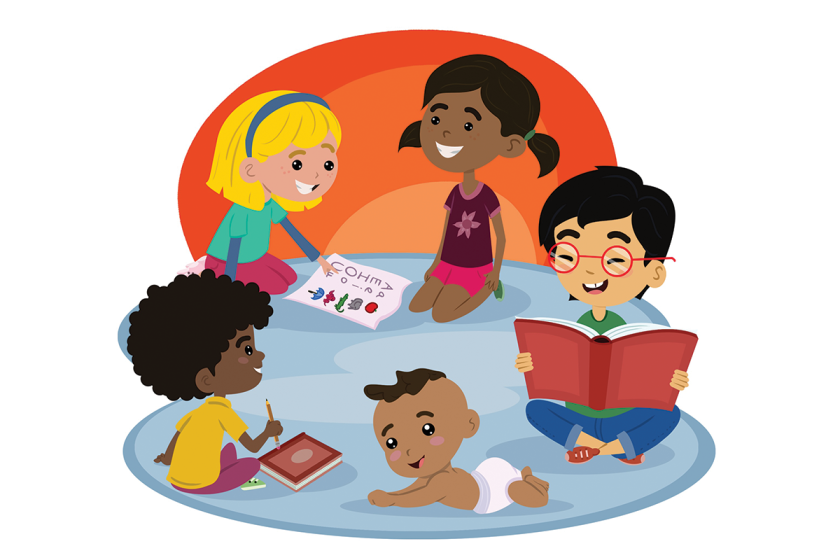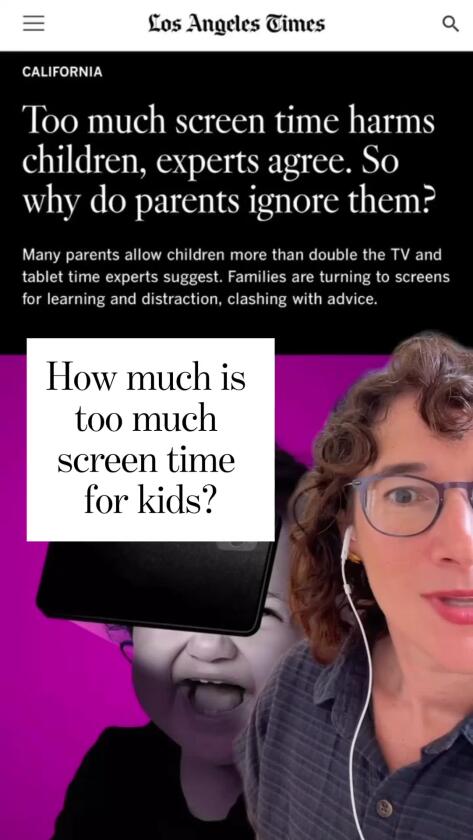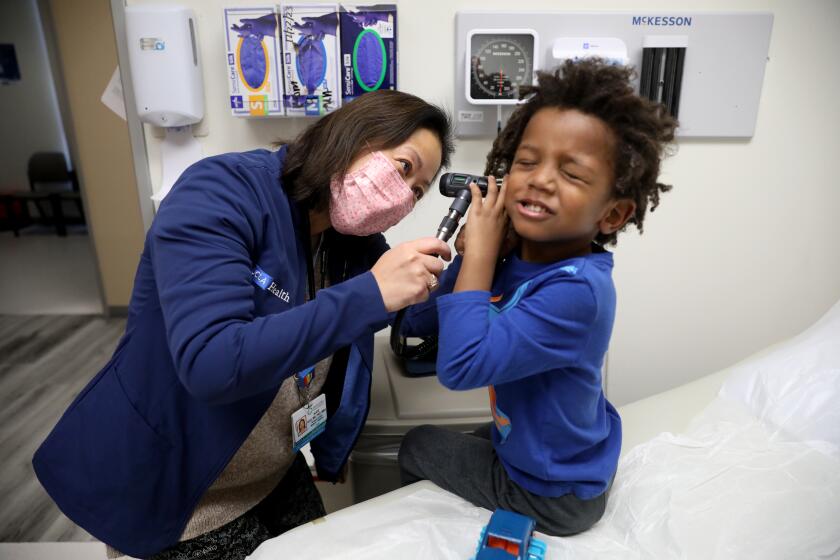
- Share via
Parents are bombarded with a dizzying list of orders when it comes to screen time and young children: No screens for babies under 18 months. Limit screens to one hour for children under 5. Only “high-quality” programming. No fast-paced apps. Don’t use screens to calm a fussy child. “Co-view” with your kid to interact while watching.
The stakes are high. Every few months it seems, a distressing study comes out linking screen time with a growing list of concerns for young children: Obesity. Behavioral problems. Sleep issues. Speech and developmental delays.
Find expert tips, must-read books and local resources to help your child get hooked on reading.
Maya Valree, the mother of a 3-year-old girl in Los Angeles, understands the risks and constantly worries about them. But limiting her daughter’s screen time to one hour feels impossible as she juggles life as a working parent, she said.
Over the last few years, her child’s screen time has ranged up to two to three hours a day, more than double the limit recommended by pediatricians. Valree puts on educational programming whenever possible, but it doesn’t capture her child’s attention as well as her favorites, Meekah and “The Powerpuff Girls.”
“Screen time is in the top three or five things to feel guilty about as a mom,” she said. “I’ve used it to pacify my daughter while cooking or working or catching up on anything personal or professional.”
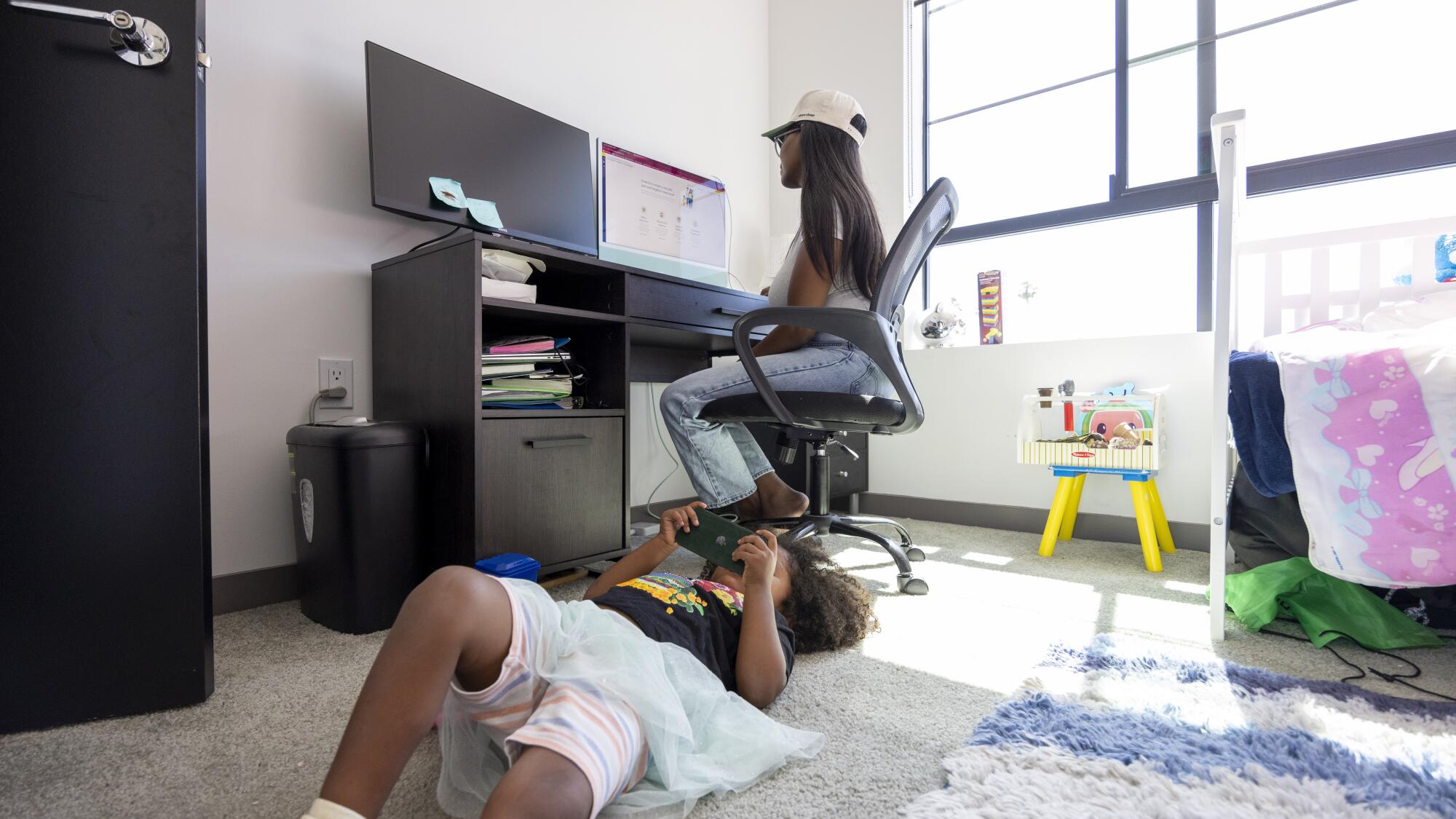
Valree is among the legions of parents who by choice or necessity allow their babies and preschoolers to watch several times more than the limit recommended by experts, creating a vast disconnect between the troubling predictions of harm and the reality of digital life for American families.
But her feelings of guilt may put Valree in the minority. Directives to limit the time young children spend on digital devices may not be taking root because many parents simply don’t believe their child’s screen time is a problem in the first place.
Parents need to have some type of distraction for their kids, and “screens tend to be the easiest option, the lowest hanging fruit,” said Dr. Whitney Casares, a Portland pediatrician and author of the book “Doing It All.” “I hear more people saying, ‘I know screen time is bad, I wish we had less of it in our family, but I feel helpless to change it.’”
Screen time use among older children made news last month, when the Los Angeles school board approved a cellphone ban on campus, and the U.S. surgeon general called for a warning on social media platforms advising parents that they can damage teenagers’ mental health.
Student cellphone use at L.A. public schools will be banned starting in January to improve learning, limit distractions and decrease cyberbullying.
Many families, however, support their children’s phone use for safety and education. For a generation of parents who grew up with cellphones and computers, such sentiments appear to start with much younger children. A national survey of families with children 8 and younger found that the majority of parents believe screen time is a net positive — helping their children learn to read, boosting creativity and even improving their social skills.
Should children under 5 have screen time?
The American Academy of Pediatrics recommends families avoid screens for babies under 18 months, with the exception of video chatting. Parents who want to introduce digital media to toddlers ages 18 to 24 months should keep it very limited, choose high-quality educational programming, always watch alongside their children, and interact with their children both during and after watching.
For children ages 2 to 5, pediatricians recommend limiting screen time to one hour a day of high-quality programming that is educational, interactive and pro-social with few or no advertisements. Parents should avoid fast-paced programs, apps with distracting content and anything with violence. Whenever possible, they should co-view with their children to help them understand what they are seeing.
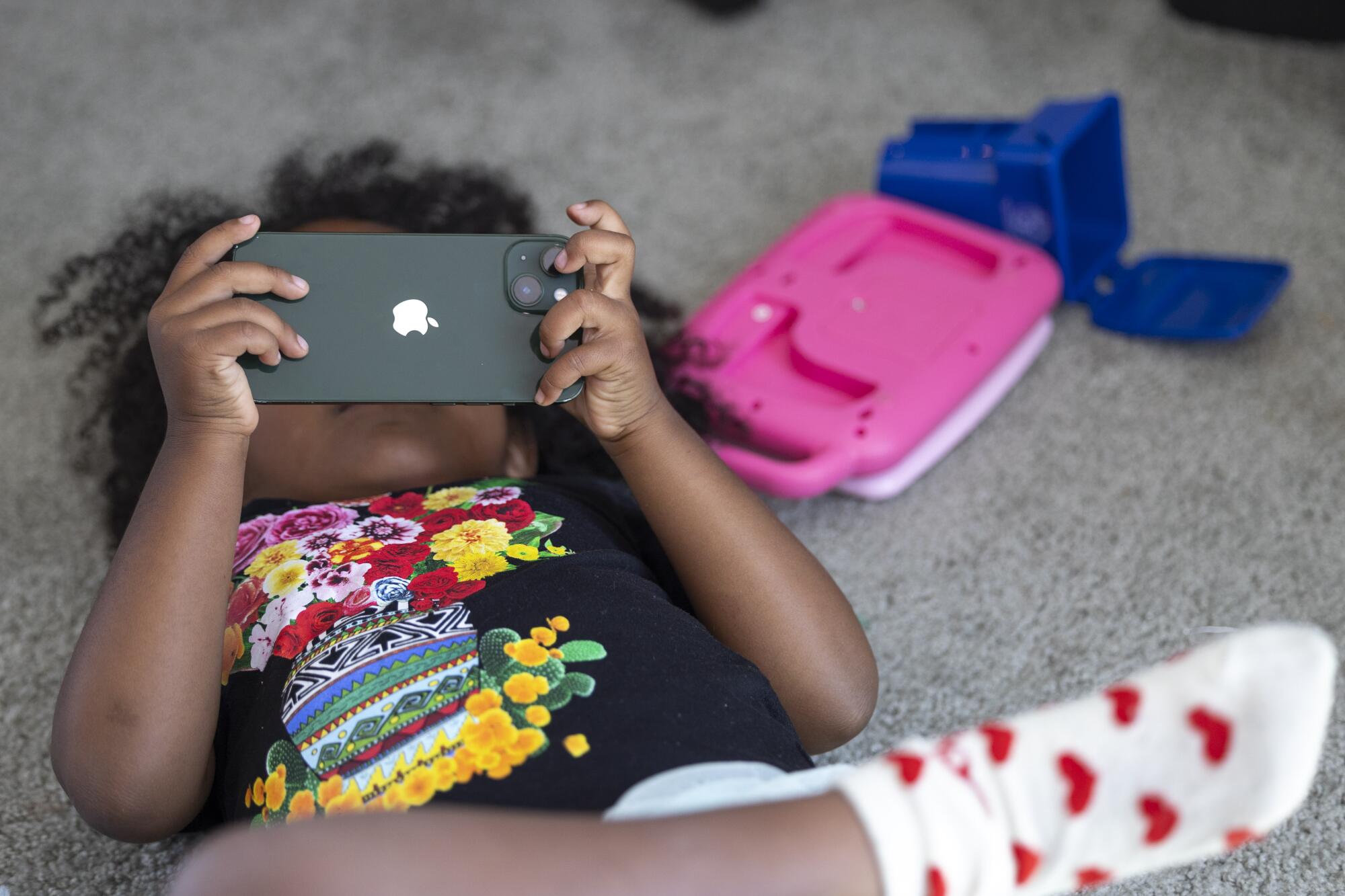
Pediatricians also recommend that children avoid screens during mealtimes and at least one hour before bedtime. When no one is watching the TV, it should be turned off. And parents should avoid regularly using screens to calm their child, because it can make it difficult to set limits and teach children to regulate their own emotions.
“We don’t want to be the scolds. It’s our job to provide information to parents but to also say we understand the reality of everyone’s current lifestyle. It’s just a different world now,” said Dr. Nusheen Ameenuddin, one of the authors of the academy’s policy statement. “[Parents] aren’t going to be perfect 100% of the time.”
More parents are choosing to delay childhood vaccinations, such as the MMR vaccine. Doctors worry toddlers remain vulnerable as measles spreads.
Jacqueline Nesi, an assistant professor of psychiatry at Brown University and author of Techno Sapiens, said screen time limits need to be a balance. While there is evidence that endless screen time — especially more than four hours a day — can be harmful, Nesi said there aren’t data to support a strict one-hour cutoff.
“As parents we know life isn’t always aligned with the recommendations. We don’t want to throw them away, but we also don’t want to be in a place where we’re demonizing all screen time.”
What percentage of parents limit their kids’ screen time?
The most recent data available come from a national survey of nearly 1,500 families with children ages 8 and younger conducted by Common Sense Media in 2020, just weeks before the pandemic closures began. The survey found that few families were coming anywhere close to pediatricians’ recommended limits.
- Children under 2 watch an average of 49 minutes of digital media a day, while the guidelines recommend avoiding screens for children under 2.
- Children ages 2 to 4 watch an average of 2.5 hours a day, more than twice the limit recommended.
- Children 5 to 8 watch just over three hours a day. The American Academy of Pediatricians does not provide strict time limits for school-age children but advises parents to make sure screen time does not displace other activities.
The majority of parents surveyed reported that they’re not concerned about the amount of time their kids spend with screens, the impact screen media have on their child or the quality of the content available to them. The survey also asked about the reasons for children’s screen use: More than three-quarters of parents said “learning” was very or somewhat important, and more than half said parents need “time at home to get things done.”
- Share via
For a generation of parents who grew up with cell phones and computers, letting kids indulge in a bit of phone or TV time doesn’t feel like a big deal.
Henja Flores, a mother of three in Fresno, said videos from YouTube sensation Ms. Rachel taught her toddler sign language and the ABC’s. “I use it as an educational thing, but also if I have to make lunch or dinner,” she said. She’s seen the headlines, but she lets her children watch two to three hours a day, as long as the shows don’t seem too overstimulating.
“I just don’t think it’s something parents need to stress about. Moms need breaks. Moms needs to get things done. As long as it’s helping, I don’t think there’s anything wrong with it at all,” Flores said.
The Common Sense survey found screen habits varied by income level, race and ethnicity. In lower-income families, for example, children were watching an average of two more hours each day than those in higher-income families.
“For lower-income families there are going to be bigger barriers to limiting screen time. It takes a lot of time and work. Higher-income families are more likely to have high quality child care, which is very expensive in our country,” Nesi said. “Sometimes screen time is serving as that thing that’s going to keep your kid occupied and safe.”
Black parents and those in lower-income households were also much more likely than their higher-income or white counterparts to perceive educational benefits to their children from screen media. Latino parents, meanwhile, had the highest level of concern about the possible negative effects of media in their children’s futures.
Why do pediatricians want to limit children’s screen time?
The strongest evidence for avoiding excessive screen times involves the “opportunity cost” — the valuable learning opportunities children miss out on during the hours they spend on digital devices.
In order to develop cognitive, language, motor and social-emotional skills, young children need to experience the world hands-on — playing with toys, exploring outside, experimenting with different materials, and having back-and-forth interactions with nurturing caregivers, Ameenuddin said. When they are watching digital media, they lose that time to grow and learn.
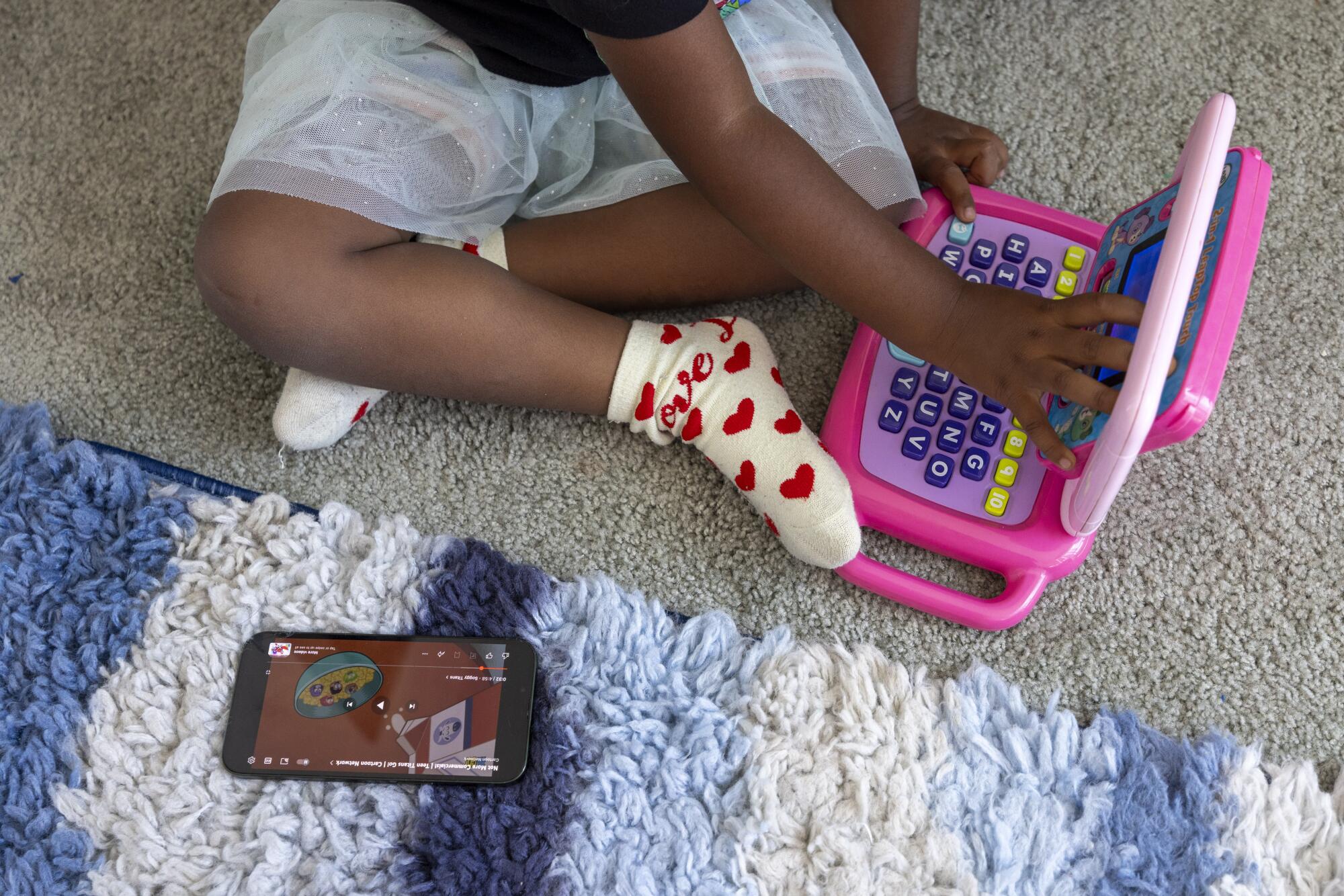
This is particularly true for babies and toddlers, because there isn’t much evidence that they can learn through screens.
For preschoolers, there’s more evidence that educational shows like “Sesame Street” can help improve literacy and social development, but only in limited amounts. Heavy media use in the early years has been linked to a greater risk of obesity because these children often miss out on physical activity and outdoor time. They’re also more like to see advertisements for sugary foods and drinks.
Deciding between preschool and transitional kindergarten isn’t easy for parents. Here’s how eligibility, structure and academic environment may differ.
Children who are watching screens also have fewer valuable interactions with caregivers and hear fewer words during the course of their days, which is linked to cognitive, language and social delays. Some studies have found evidence linking excessive screen time with behavioral issues such as ADHD, though the research did not show that one was actually caused by the other.
A bigger question is whether the screen time is changing the wiring of babies’ and young children’s brains. A small MRI study of preschoolers found that children who watched more than the recommended one hour a day had lower development in the brain’s white matter that supports language and early literacy skills. But Ameenuddin says the evidence isn’t clear yet that screens themselves are affecting brain development.
Is screen time harmful for babies?
Babies should be playing and exploring the world, not watching screens, experts advise.
In the first three years of life, more than 1 million neural connections are formed every second, and key to this development are the “serve and return” interactions between children and their caregivers, according to Harvard’s Center on the Developing Child. Babies babble and make faces and gestures, and the people who love them respond in kind. Without these important interactions, the brain’s architecture can’t form the way it should.
These sorts of interactions don’t happen through screens.
A recent Japanese study found that the more time a baby spent watching screens at age 1, the more likely they were to have developmental delays in communication and problem-solving at ages 2 to 4 — particularly when they watched more than four hours a day.
But Nesi, the psychiatry professor, said there’s no need to shield a baby’s eyes when in a room with a television on. “There’s a lot of fear messaging around this, and there’s no evidence to suggest that your baby catching a glance of a screen every once in a while could do harm.”
Most California kids rely on Medi-Cal for vital preventive care, but many are missing necessary health screenings because of trouble accessing its services.
How can I make the most of screen time?
“There is a lot of incredible, cool stuff for kids to watch and do on screens,” said Jill Murphy, chief content officer at Common Sense Media, which offers quality ratings and media reviews for children. In general, Murphy says it’s safer to stick with branded content from a production company that’s intended for young children, which often have child development staff or advisors.
YouTube Kids requires more parental guidance, she said, and parents need to evaluate videos in advance. If they can’t, they should create a profile with a child’s selected interests and a set number of videos coming into the feed.
“Anything violent is a hard no for young kids, even if it’s play slapping or hitting each other with a stick,” said Murphy. “They’re very quick to mimic that behavior.”
Researchers recommend age-appropriate programming that actively involves children by asking them questions, helps them make meaningful connections to their everyday lives, and includes “socially meaningful” characters they can get to know rather than a disembodied voice.
Murphy says parents should designate screen-free zones and times, and set clear limits around when screen time will end. And whenever possible, stick with high-quality educational content without commercials, like the kind found on PBS Kids, which has been found to lead to better behavioral outcomes and language skills.
Set boundaries, avoid screens around bedtime, and whenever possible, watch alongside your child.
This article is part of The Times’ early childhood education initiative, focusing on the learning and development of California children from birth to age 5. For more information about the initiative and its philanthropic funders, go to latimes.com/earlyed.
More to Read
Sign up for Essential California
The most important California stories and recommendations in your inbox every morning.
You may occasionally receive promotional content from the Los Angeles Times.
